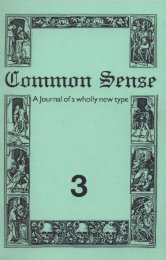i on thomas paine reviews: origins of crisis in ussr - Common Sense
i on thomas paine reviews: origins of crisis in ussr - Common Sense
i on thomas paine reviews: origins of crisis in ussr - Common Sense
You also want an ePaper? Increase the reach of your titles
YUMPU automatically turns print PDFs into web optimized ePapers that Google loves.
Page 40 Comm<strong>on</strong> <strong>Sense</strong> - Issue 15<br />
the fragility fo capitalism. It is an attempt to understand capitalism from the<br />
perspective <strong>of</strong> its c<strong>on</strong>tradicti<strong>on</strong>s. The theories which seem to c<strong>on</strong>vert Marxism <strong>in</strong>to<br />
a theory <strong>of</strong> capitalist reproducti<strong>on</strong> (regulati<strong>on</strong> theory, neo-Grarnscianism etc) lose<br />
sight <strong>of</strong> the very core <strong>of</strong> Marxism.<br />
The sec<strong>on</strong>d thesis which I wish to advance, then, is that Marxism is not a theory<br />
<strong>of</strong> cqitalist oppressi<strong>on</strong> but <strong>of</strong> the c<strong>on</strong>tradicti<strong>on</strong>s <strong>of</strong> that oppressi<strong>on</strong>. This gives<br />
Marxism a special relevance for any pers<strong>on</strong> or movement <strong>in</strong>terested <strong>in</strong> a radical<br />
transformati<strong>on</strong> <strong>of</strong> society.<br />
How can we understand the fragility (or c<strong>on</strong>tradicti<strong>on</strong>s) <strong>of</strong> capitalism? The third<br />
thesis that I want to suggest is that the fragility <strong>of</strong> capitalism is the expressi<strong>on</strong> <strong>of</strong><br />
the power <strong>of</strong> labour.<br />
S<strong>in</strong>ce this thesis goes aga<strong>in</strong>st much <strong>of</strong> the Marxist traditi<strong>on</strong>, it is necessary to<br />
expla<strong>in</strong> it.<br />
In the so-called 'orthodox' traditi<strong>on</strong>, a clear separati<strong>on</strong> is made between the<br />
c<strong>on</strong>tradicti<strong>on</strong>s <strong>of</strong> capitalism, <strong>on</strong> the <strong>on</strong>e hand, and class struggle, <strong>on</strong> the other. In<br />
this perspective, the c<strong>on</strong>tradicti<strong>on</strong>s <strong>of</strong> capitalism exist <strong>in</strong>dependently <strong>of</strong> class<br />
struggle: they are objective laws <strong>of</strong> capitalist development. The development <strong>of</strong><br />
these c<strong>on</strong>tradicti<strong>on</strong>s def<strong>in</strong>e the objective framework with<strong>in</strong> which class struggle<br />
develops. The specific c<strong>on</strong>tributi<strong>on</strong> <strong>of</strong> Marxism to class struggle is understood <strong>in</strong><br />
terms <strong>of</strong> the analysis <strong>of</strong> the objective c<strong>on</strong>diti<strong>on</strong>s <strong>of</strong> struggle. Marxism, from be<strong>in</strong>g<br />
a theory <strong>of</strong> struggle, becomes transformed <strong>in</strong>to a theory <strong>of</strong> the objective c<strong>on</strong>diti<strong>on</strong>s<br />
<strong>of</strong> struggle.<br />
In this separati<strong>on</strong> <strong>of</strong> c<strong>on</strong>tradicti<strong>on</strong> and struggle can be found the core <strong>of</strong> the so-called<br />
'<strong>crisis</strong> <strong>of</strong> Marxism'. Certa<strong>in</strong>ly, it is has been argued that the idea that objective<br />
c<strong>on</strong>diti<strong>on</strong>s are <strong>on</strong> our side played, perhaps, a positive role <strong>in</strong> stimulat<strong>in</strong>g and<br />
strengthen<strong>in</strong>g the struggle aga<strong>in</strong>st capitalism, but the more the d6nouement <strong>of</strong><br />
history has been postp<strong>on</strong>ed, the more obvious the problems <strong>of</strong> this approach have<br />
become.<br />
The basic problem is that this approach implies a theoretical and <strong>of</strong>ten practical<br />
subord<strong>in</strong>ati<strong>on</strong> <strong>of</strong> struggle to the objective c<strong>on</strong>diti<strong>on</strong>s, and therefore an underm<strong>in</strong><strong>in</strong>g<br />
<strong>of</strong> the power <strong>of</strong> labour <strong>in</strong> its struggle aga<strong>in</strong>st capital. This subord<strong>in</strong>ati<strong>on</strong> <strong>of</strong> struggle<br />
has taken very c<strong>on</strong>crete forms <strong>in</strong> recent years <strong>in</strong> the discussi<strong>on</strong>s around the c<strong>on</strong>cept<br />
<strong>of</strong> 'post-Fordism'. Often it has been argued that the class struggle has to submit to<br />
the <strong>in</strong>evitable tendency towards the creati<strong>on</strong> <strong>of</strong> a new 'post-Fordist' mode <strong>of</strong><br />
regulati<strong>on</strong>. A notorious example is provided by the argument made by Stuart Hall<br />
dur<strong>in</strong>g the m<strong>in</strong>ers' strike <strong>in</strong> Great Brita<strong>in</strong> <strong>in</strong> 1984-1985: accord<strong>in</strong>g to Hall, it was<br />
necessary for the m<strong>in</strong>ers to recognise the <strong>in</strong>evitability <strong>of</strong> submitt<strong>in</strong>g to the<br />
'<strong>in</strong>escapable l<strong>in</strong>es <strong>of</strong> historical tendency and directi<strong>on</strong>' - an elegant, post-structuralist<br />
expressi<strong>on</strong> <strong>of</strong> pure determ<strong>in</strong>ism.<br />
If Marxism is identified with this approach, it is easy to see why people talk <strong>of</strong> a<br />
<strong>crisis</strong> <strong>of</strong> Marxism. On the <strong>on</strong>e hand, it is difficult to rec<strong>on</strong>cile many <strong>of</strong> the<br />
unforeseen changes <strong>in</strong> the world with this idea <strong>of</strong> '<strong>in</strong>escapable l<strong>in</strong>es <strong>of</strong> historical<br />
tendency and directi<strong>on</strong>'; and, <strong>on</strong> the other, it is clear that this type <strong>of</strong> Marxism has<br />
little attracti<strong>on</strong> as a theory <strong>of</strong> struggle.



